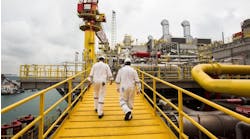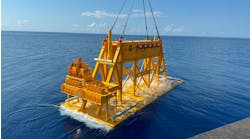Shell's recent restatement of proven undiscovered reserves means good news for the oil field service companies. Last month Shell announced it was lowering its estimates of proven undeveloped reserves by 20%. Proven undeveloped reserves (PUDs) are reserves in known fields that are not accessible through existing wells. Analysts and investors do not consider such reserves to be as valuable as proved reserves, but they still have value.
Shell's stock price took a hit on this news, and the US Securities and Exchange Commission is now looking into how such reserves are calculated. Other operators were quick to defend their methods. Jim Wicklund, managing director of Energy Research at Banc of America, said the SEC does not regulate the reporting of these reserves, but simply stipulates the operator should have "reasonable certainty" in classifying its reserves. This announcement will result in increased scrutiny by the SEC of not just Shell's reporting but that of all oil and gas operators.
Wicklund said the Shell announcement will have a far reaching effect on the market. Basically, when a company estimates its PUDs, it is saying it is able to develop this amount of reserves at the current oil price using existing technology and identified fields. The actual estimated reserves in the ground have not changed. Wicklund said there is still the exact same number of oil molecules in the ground. What has changed is the cost of recovering some of these reserves. Shell's revision is based primarily on two large fields and reserves that it does not feel could be recovered at the current oil price.
What this means in a broader sense is that, when push comes to shove, it will take a higher oil price to justify the recovery of these reserves. There is no question that Shell is going to develop these reserves, but it is going to cost more, Wicklund said. This has already driven long-term oil futures higher. Wicklund said it will also affect the perceived value of service stocks. These companies make their living recovering reserves for the operator. If the reserves are more expensive to recover, then the difference is going to the service company's bottom line.
While Shell is just one company, Wicklund said it accounts for 65% to 70% of the service sector's international market. Even if this is the only case of reassessing PUDs, it will have a major impact on a number of service companies. Furthermore, the increased scrutiny of the SEC is bound to identify other companies who over-estimated their PUDs. Even if these are statistically small errors, 1-5%, they will make news and reinforce the upward trend in future oil prices and the value of the service companies.
Wicklund said that the short-term effects will be minimal, but they are already apparent. Based on the Shell information alone, he said, the value investors place on the service sector is on the rise.
Expectations of rising prices and increased value in the service sector long-term are encouraging news after several years of flat growth.
The industry has clearly been in a holding pattern for months, with prices stable, rig counts down, and operators sitting on their hands. It is ironic that such a major correction in an operator's calculated value may be the catalyst that drives the next recovery.
Whatever the impetus, no one can deny that the recovery has been a long time coming, and the service companies are due for some good news.
William Furlow


